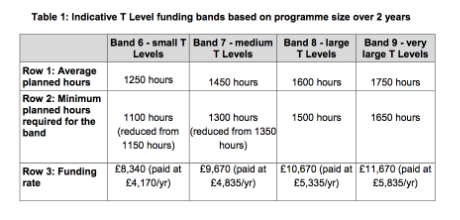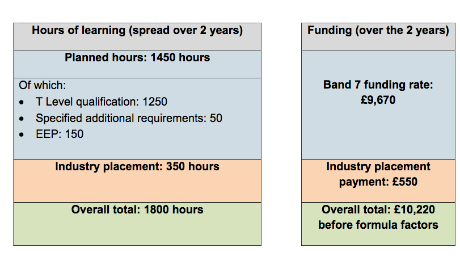
The Education and Childcare T-Level, a college-based vocational equivalent to an A-Level, will attract base payments of £4,835 per year while a cost weighting will take the annual rate to £5,802.
This means that for T-Levels such as childcare, which launch in 2020, the rate is ‘certainly more favourable than current funding', one industry expert said.
Revealed in a consultation response published this week, the move is thought to be designed to incentivise training providers to put students on T-Levels as opposed to standard Level 3 Early Years Educator programmes. The funding rate also does not drop for 18-year-olds doing T-Levels (unlike with current study programmes).
The incentive may be needed if predictions about low takeup is borne out. Research earlier this week showed the first wave of T-Level providers are expected to recruit half the number of students the Government predicted, according to FE Week.
The consultation response says the final funding rates will be confirmed in autumn this year.
The funding bands (Education and Childcare is band 7) which will be confirmed this autumn

Placement funding
Childcare and education is expected to take around 1800 hours over two years, including placement time (1450 + 350). This is in line with overall study time for a current college-based Cache Level 3 Diploma in Childcare and Education.
Controversially however, the T-Level placement is half the length of the current industry standard, and funding for the placement is based on the industry average of 350 hours and stands at £550 per year. This is despite the DfE having admitted childcare placements are likely to need to be expanded to confer licence to practice at level 3. A DfE spokeswoman told Nursery World earlier this year that the total time spent in the workplace for a childcare and education T-Level should be ‘in line with current practice of 730-750 guided learning hours’.
The Government has released extra cash, such as the Capacity and Delivery Fund (CDF), available this year to assist providers of the first T-Levels to prepare for industry placements, and £500m per year of additional funding in 2019/20 ‘to deliver the extra hours of provision and provide for the higher cost courses as well as the necessary support for disadvantaged students and for industry placements.’ The Government has said it will ‘look at’ placement funding ahead of the spending review but makes no firm commitments to raise it.
Insiders say however that the increased funding rates for 18-year-olds, the industry placement payout and increased overall funding rates for T-Levels come to about £500m.
The Government also says it wants to keep the £550 payment for all T-Levels regardless of sector. ‘We recognise that some placements may cost more to deliver than others. However, we do not think it would be practical to introduce assumptions, factors and calculations that would vary the £550 per placement in an attempt to reflect costs in every situation’ the consultation said.
How the qualification is structured:

EEP = employability, enrichment and pastoral provision
Among the other announcements were:
- a 30k one off payment in ‘recognition of the additional costs that are unique to the early T-Level providers’ for each new T-level introduced in 2020 with the possibility this will be extended to providers offering new T levels in 2021/22, but no further. Further details will be published in summer 2019.
- £3.75 million for 2019/20 to cover costs such as producing high-quality materials to help with recruitment
- That level 2 maths and English will be funded - £750 per pupil per subject
Further information
- Funding report here
- 36 providers expected to deliver 1st wave childcare and education T levels
- 42 providers in the second 2nd wave









